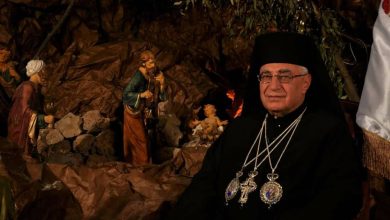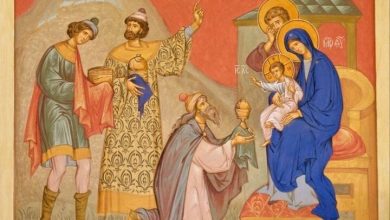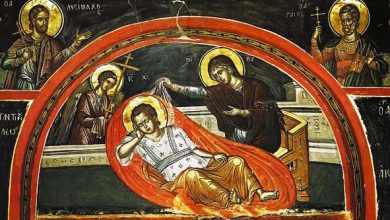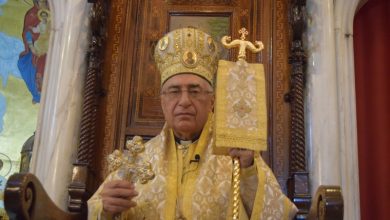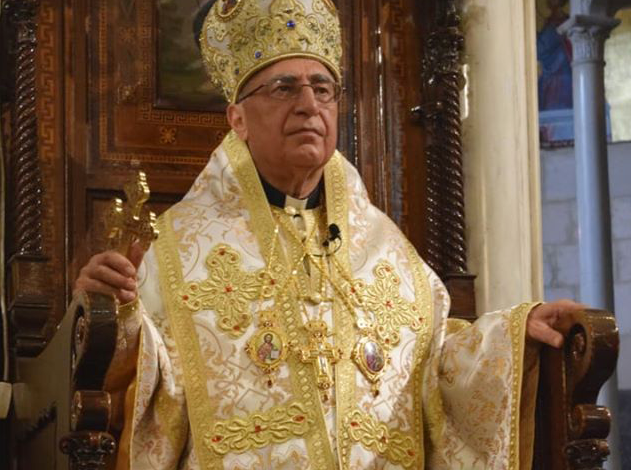
Paschal Message of H. B. Youssef
Melkite Greek Catholic Patriarch
of Antioch and All the East
April 12, 2020
Christ is risen!
With a heavy heart we cry out the cry of victory – which we await from year to year – in empty churches! We miss you dearly, beloved sons and daughters, wherever you may be.
Christ is risen! It is with a heavy heart indeed that we shout out this exclamation of faith and victory, after fifty days of praying and fasting, without finding faithful in our churches to respond: He is truly risen! How can we sing Christ is risen, ‘Christos anesti’, without hearing your voices repeat it vibrantly and joyfully?
It is sad that you were not able to be anointed with the Oil of repentance, nor able to receive the Body and Blood of Our Lord and Savior Jesus Christ in his Pascha, the commemoration of his Passion and Resurrection.
Our Paschal celebrations this year are marred by heartache, as the churches are empty: not only the faithful are missing, but also our cherished children. With their purity, innocence, and smiles, our children are a living sign of hope and joy. They remind us that the kingdom of heaven belongs to them; the future too, a future which we hope will be more humane, with more solidarity, more compassion, and more mutual love; a future in which differences between people will diminish or even disappear, and a new world order will arise with justice, equality, peace and joy, for the Earth has enough room and resources for all peoples.
True, children are silent in this year’s paschal solemnities, but the stones will speak: the stones of our churches will echo their voices which are stored there year after year, proclaiming: He is truly risen!
This year we have especially captured the meaning of the Lords’ saving Cross and Resurrection and how they are intimately related. We entered the Holy Week of the Savior’s Passion with inner joy and peace, not with sadness nor fear, because the Divine Master, by his death on the cross and his Resurrection on the third day, conquered death and filled our hearts with faith and the hope that he would always triumph over pain and evil.
How much we need hope and faith in these difficult days as we experience the pain, anxiety and fear of the corona pandemic that sweeps the world?! We now remember Saint Paul’s words to the Romans: “Suffering produces perseverance; perseverance, character; and character, hope. And hope does not put us to shame, because God’s love has been poured out into our hearts through the Holy Spirit, who has been given to us.” (Rom 5: 3-5). We also remember what he wrote to the Corinthians: “With the trial, God will also provide a way out” (1 Cor 10: 13). We believe that God created the world beautiful and good; in no way would He have accepted it otherwise. It’s God’s world before being the world of man; and God loves His world; so how can He let it perish as Evangelist John says: “God so loved the world, that He gave His only begotten Son, that whoever believes in Him shall not perish, but have eternal life. For God did not send the Son into the world to judge the world, but that the world might be saved through Him” (Jn 3: 16-17).
As we celebrate the Resurrection of Our Lord, God and Savior Jesus Christ from the dead, a solemnity so dear to our hearts, the whole world is desperately struggling with a pandemic that befell it, sowing death everywhere, oppressive as a horrible nightmare. People are left confused and helpless. As if for the first time, an enemy called death has suddenly appeared in their homes and invaded factories, schools, hospitals, stores and streets, chasing people from place to place and striking at random. They hurriedly marshalled all their scientific and technological capabilities to contain it for they realized it was a matter of life or death.
Death! People seem to have completely forgotten it in the midst of their preoccupations with the affairs of life, feverishly running after their livelihood, or blindly embracing atheism, materialism, agnosticism, and many other frivolous absurdities. They have closed every window that might let in some light from another world or simply remind them that there is another world.
In the year of the corona, the Resurrection of Jesus Christ reminds us, his followers, that death is not an ordinary matter, nor a natural conclusion for human life followed by nothing. Death is not a futility unworthy of attention and concern, but the archenemy of humankind. Fortunately, Our Lord’s Resurrection comes at the right moment to remind us that by his Resurrection, Christ has totally and completely crushed the power of death which Saint Paul calls the last enemy: “(Christ) must reign until he has put all his enemies under his feet. The last enemy to be destroyed is death” (1 Cor 15: 25-26).
Today’s feast reminds us that the last word is not for death but for life, because Jesus Christ is the Resurrection and the Life. “He is not the God of the dead but of the living.” (Matthew 22:32). God did not tell man “be” to let him die, but to live forever. And death, no matter how strong is its thorn, is doomed forever: “Death is swallowed up in victory. Where, O death, is your victory? Where, O death, is your sting?” exclaims the Apostle Paul (1 Cor 15: 54-55).
By his Resurrection, Our Lord rekindled hope in our hearts and gave us strength to fight death in its various threatening forms. The corona that strikes us these days is not the only, nor the most dangerous epidemic: There is death between individuals, family members, parishioners, societies and nations. Death has infiltrated human relations because they are fatally corrupted by selfishness, individualism, tribalism and hostility. We see in the corona crisis some typical examples: Countries that refrain from helping other countries that are in d+ire need because they disagree with their political line or don’t obey their directives or simply because they are considered without value. We see individuals who hoard vital articles as if other people have no right to life.
The Resurrection of Our Lord calls us to restore these perturbed relationships by building trust among people. The Resurrection invites us to view the other as a brother and friend, not an enemy or an adversary. The Resurrection invites us to love the world as the Divine Master loved it.
That is what distinguishes the children of God as St. Augustine says: “He who does not promote justice and does not love his brother is not from God. Therefore, love alone is the distinctive mark that can tell God’s children from the sons of Satan.” Today more than ever before, we need to restore the due respect to the family, to the school and to the parish. We need to recognize their utmost importance and the primary role they play in our societies. They are the most suitable places for promoting good relations among people.
There is death also in our relationship with God, or rather God’s death in our lives, the death of faith. We have eliminated God and everything that reminds us of him. We have excluded him from our lives, and consequently we have suppressed our spiritual and human dimensions. When the corona epidemic stealthily befell us, we were surprised to find ourselves spiritually unprepared to cope with the new situation. We immediately felt the need to pray and return to God. An invisible virus had disrupted our lives and instilled anxiety in our souls!
Nevertheless, with our Lord’s Resurrection we feel strong, despite all our weakness, and able to renew our faith in God and the power of Jesus’ Resurrection from the dead.
However, there are people who question the Resurrection of the Lord; some even categorically deny it or consider it a myth. True, the Resurrection is such an awesome event that it appears too beautiful to be true. In fact, the first to doubt it were the Apostles themselves (Matthew 28:17; Mark 16:11), especially Thomas who declared his doubt and demanded concrete proofs.
The Evangelist Luke says the Apostles considered the story of the women who announced the Resurrection of Jesus to them as “nonsense” (Luke 24:11). Luke adds that “while they were still speaking about this, Jesus stood in their midst and said to them, ‘Peace be with you.’ But they were startled and terrified and thought that they were seeing a ghost.” (Luke 24: 36-37)
Only after the Apostles had examined the empty tomb, and seen, heard, and touched their living Master did they believe. They were thus able to proclaim the Resurrection of the Lord with such a profound conviction that they gave their lives for him. If we are unable to perceive supreme beauty, this does not mean that it doesn’t exist. Rather, in order to see it, we need to have a special kind of eyes, the eyes of faith.
The ones who have received the Christian faith from the Apostles possess such eyes. That’s us. We are the ones about whom Jesus aid: “Blessed are those who have not seen and have believed” (Jn 20: 29).
We are the ones whom John meant in today’s gospel when he says “But to those who did accept him he gave power to become children of God, to those who believe in his name, who were born not by natural generation nor by human choice nor by a man’s decision but of God” (John 1:12- 13). These faithful to whom we belong have overturned the equation: Reflected in their evangelical life, their faith bears evidence to the Resurrection, not the opposite.
That’s the utmost beauty of the Resurrection which we celebrate today. It’s the faith of which the Apostle Paul spoke when he addressed those who questioned the Resurrection in his time: “If Christ has not been raised, then empty is our preaching; empty, too, your faith… If Christ has not been raised, your faith is vain; you are still in your sins” (1 Cor 15: 13-17).
It means that there is no Christ, no Christian faith, no Christian religion, and no salvation without the Lord’s Resurrection. The Resurrection is the pillar of the Christian faith and the seal of its integrity. It was the main subject of the Gospel preached by the Apostles. We may call it the “Big Bang” that projected Christian life into an endless space and time. That’s precisely what our liturgy of Pasha calls “The day that has no evening,” or also the “Kingdom,” which Our Lord promised the thief and actually inaugurated as he was still on the cross.
Today, the risen Jesus Christ comes to our cities, towns and neighborhoods, accompanying us in the heart of our lives and offering to save us from servitude, evil and sin; from hatred and oppression; from pride and vanity; from darkness and doubt. He can help us make life more humane, and open up to us divine horizons, with a new Earth and new Heavens.
Today, our lord Jesus comes to us, humble in his victory, carrying salvation within His Resurrection. Let’s open our homes to him and spread our hearts before him and cheer for him. Let’s make a place for him in every house so he can shine his Light upon us today and afterwards, whether the churches are closed or open.
But the churches will not remain closed for long, God willing. We will resume meeting in the church because God has chosen it as his dwelling. It’s the place where the Bridegroom, the Lord Jesus, meets his Bride, the Christian community. The common prayer in the church is a primal and venerable tradition. No other prayer can replace it or abrogate it. Countless sons of ours long to come back to church in these difficult days.
In this salvific season, we pray for each other. We pray that the corona pandemic will not be long; that the Good Lord may heal those who have been affected by it and receive its victims among the Angels and the Saints. We pray for all those who have volunteered to avert the imminent danger: the doctors, the nurses, the scientists, the officials, the technicians, the various governmental and non-governmental institutions, asking God to bless their endeavor for the sake of our country and for the whole world.
We pray God to enable the International Community to overcome the pandemic by setting up a coordinated plan that would be carried out wholeheartedly in a comprehensive act of love beyond all boundaries whatsoever.
We pray the Good Lord to inspire each one of us to do what we can in order to alleviate suffering.
We pray for safety, peace, stability and prosperity in our respective countries. May peace and justice prevail all over the world.
While we pray, we should also sincerely forgive each other. In the paschal service, the Church teaches us that forgiveness gushes from the Lord’s tomb. With the forgiveness coming from the Lord’s tomb, let’s bury our conflicts and differences, our difficulties and problems, our troubles and concerns, our bitterness and disappointments, our sins and weaknesses. Let’s bury death itself! Led by the Church, let’s all join in singing with hope and faith, with joy and exultation, with optimism and determination:
“Today is the day of the Resurrection! Let us glory in the Feast and embrace one another. Brethren, let us say: ‘Because of the Resurrection, we forgive all things to those who hate us.’ And let us all sing together: ‘Christ is risen from the dead and by his death he has trampled upon death and has given life to those who are in the tomb.’”

